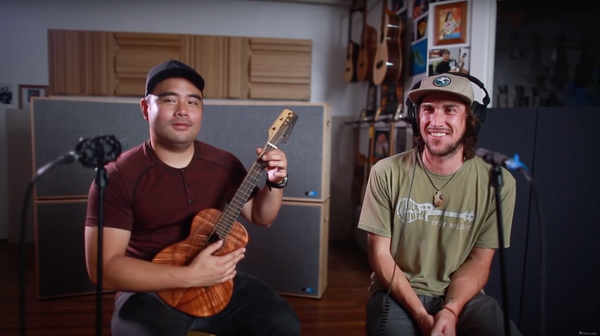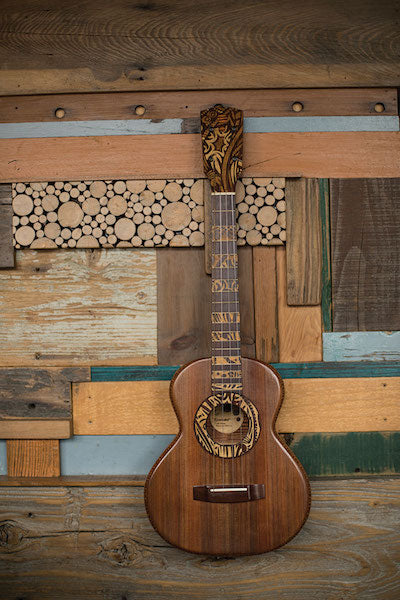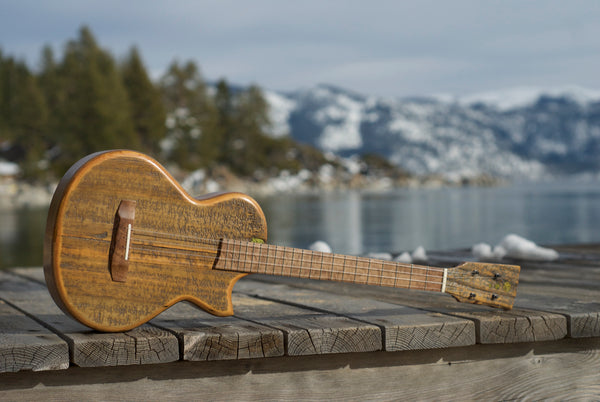USA Today

When Devin Price and Tyler Joersz craft a ukulele, they don’t see it as just making an instrument.
They see it as breathing life back into nature.
On a warm spring morning in their company studio, they admire one of the ukuleles in the works. The front of it is made from wood collected from a weathered
“You can’t do what nature does, no matter how hard you try,” Price said while holding the work in progress.

The instruments look the prices, though. While traditional ukuleles are made from dark Hawaiian Koa wood, theirs are a skillful patchwork of a wide range of woods, including Koa but also Walnut, Redwood, Cedar, Ziricote and Bamboo, among others. Unlike most ukuleles, theirs are rounded for durability, sound and comfort.
"No two ukuleles look alike," said Roseville, Calif.'s Jion Jugo of TyDe's collection.
As one of the professional ukulele musicians that TyDe endorses, he tests out the goods before they are sold. Jugo, whose YouTube videos show him plinking away at the strings and rocking solos on them, said he's never come across ukuleles with such an "organic feeling." For a year, he played on one that he "had the privilege of playing," called the Lucky No. 7, and now he's playing one he calls "My Ninja" until it too sells.
"The sound of their ukuleles are really like an individual's voice," Jugo said.
The instruments are treated like individuals too.
Like Lucky No. 7 and My Ninja, all of the custom ukuleles have names. Fanger is named for the two long finger- or fang-like grains on its back. Dirty Blonde is named for its combination of muddy Walnut and blonde Mahogany woods. Cava is named for the resemblance of the grain to the shimmer of a Spanish wine by the same title.
“You can fall in love with it like a pow day. As soon as you get done skiing, that was the best skiing ever, right? Well, when we finish (a ukulele) that’s really nice, we’re like -- that’s the best one we’ve made,” Price said, explaining the affection that he and Joersz have for each instrument they make.
TyDe's reputation is catching them attention from big names among the ukulele community, such as Bobby Alu and
In total, the luthiers have made about 100 ukuleles in their half-dozen years of innovation. While Price jokes that he has spent $60,000 investing in a business that he started to avoid paying $2,000 for a ukulele, it's all been worth it. Business is riding the wave of the instrument's popularity, spurred by viral songs such as
https://youtu.be/VqlEkbX72F0
Price, 34, and Joersz, 31, are the co-founders of TyDe Music, a custom ukulele company that creates ukuleles inspired by the natural surroundings of their home base in North Lake Tahoe’s Kings Beach.
"It’s a magical place that offers beauty and nature, and that’s where we’ve been inspired," Joersz said of the Tahoe area. "We’re also trying to be respectful to nature, not just cutting down stuff. We're finding stuff that’s fallen down and actually been curing in nature for years."
Childhood friends who grew up in
“I couldn’t really afford it, so I thought maybe I could make one,” he said.
It took them an entire year to make their first ukuleles. They learned from books, videos and lots of trial and error. With approval from Roundwood Furniture, a custom furniture company which they still work for, they used a smattering of scrap wood to make their first pieces.

“The both of them have just have a creative head on them that allows them to make these beautiful instruments that look incredibly one-off,” Florsheim said.
Having been to ukulele festivals and artisan fairs, Florsheim is convinced that the co-founders of TyDe are in a league of their own, though they've been in the trade for probably a quarter of the time of most luthiers. Not to mention, their pieces look like masterpieces on the shelf.
"I think they can stand up to the best of the best," Florsheim said.
The ukuleles are made in the new TyDe studio, a four-room industrial building that smells of sawdust, is painted in murals made by friends and is tucked back into a grove of pine trees just north of the lake. Price and Joersz, who have hired only one other employee so far, spend anywhere from 40 to 100 hours in the studio to make one instrument, which is why the instruments cost a pretty penny.

The instruments look the prices, though. While traditional ukuleles are made from dark Hawaiian Koa wood, theirs are a skillful patchwork of a wide range of woods, including Koa but also Walnut, Redwood, Cedar, Ziricote and Bamboo, among others. Unlike most ukuleles, theirs are rounded for durability, sound and comfort.
"No two ukuleles look alike," said Roseville, Calif.'s Jion Jugo of TyDe's collection.
As one of the professional ukulele musicians that TyDe endorses, he tests out the goods before they are sold. Jugo, whose YouTube videos show him plinking away at the strings and rocking solos on them, said he's never come across ukuleles with such an "organic feeling." For a year, he played on one that he "had the privilege of playing," called the Lucky No. 7, and now he's playing one he calls "My Ninja" until it too sells.
"The sound of their ukuleles are really like an individual's voice," Jugo said.
The instruments are treated like individuals too.
Like Lucky No. 7 and My Ninja, all of the custom ukuleles have names. Fanger is named for the two long finger- or fang-like grains on its back. Dirty Blonde is named for its combination of muddy Walnut and blonde Mahogany woods. Cava is named for the resemblance of the grain to the shimmer of a Spanish wine by the same title.
“You can fall in love with it like a pow day. As soon as you get done skiing, that was the best skiing ever, right? Well, when we finish (a ukulele) that’s really nice, we’re like -- that’s the best one we’ve made,” Price said, explaining the affection that he and Joersz have for each instrument they make.
TyDe's reputation is catching them attention from big names among the ukulele community, such as Bobby Alu and
In total, the luthiers have made about 100 ukuleles in their half-dozen years of innovation. While Price jokes that he has spent $60,000 investing in a business that he started to avoid paying $2,000 for a ukulele, it's all been worth it. Business is riding the wave of the instrument's popularity, spurred by viral songs such as
The local lake community has been equally supportive.
"Tahoe is kind of like an island here. We’re kind of on Tahoe time. There’s a lot of Hawaiian influence here too," said Joersz, who thinks of the Tahoe area as a sibling to the
What's next for the master ukulele makers of the area?
They are planning a more affordable, "simple production" line of ukuleles, which are likely to be priced at about $375 to $475 because they will take far less time, about 10 to 12 hours, to make. Already available are box didgeridoos, cajons, guileles (ukuleles with six strings), music stands, iPhone sound amplifiers, picks and wooden cards.
Within a year, they hope to working on guitars as well. Granted, they are going to continue to focus on ukuleles, the reason they are in business in the first place.
"If everyone played the ukulele, it’d be a better place here. I never wanted to punch anyone when I was playing," said Price smiling.



